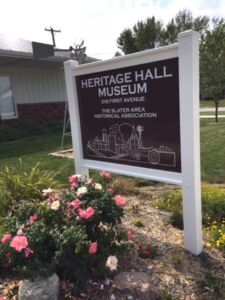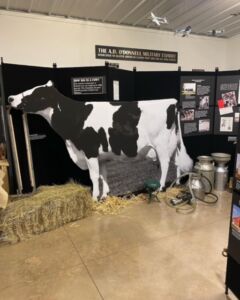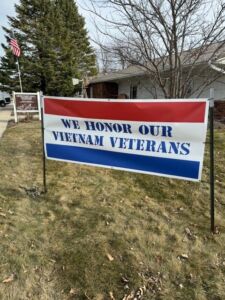Volunteer-Run History Organization Makes Advances with STEPS

Evy Raes, Slater Area Historical Association Board Member
Editor’s Note: The AASLH Standards and Excellence Program for History Organizations, known as STEPS, is a self-assessment tool that helps history organizations meet national standards. The Iowa Museum Association (IMA) received a grant from the National Endowment for the Humanities and Humanities Iowa to take a cohort of the state’s museums through STEPS over two years. As part of this grant, IMA created an online portal for the cohort to work through the STEPS sections and paired members of the cohort with mentors from other Iowa museums. In this post, Evy Raes, a board member with a county historical society that was part of the cohort, shares her experience with STEPS. Note that if you and your organization would like to use STEPS, the program is designed and can be completed self-guided.
Our museum, Heritage Hall, supported by the Slater Area Historical Association, has been incorporated since 1999. As our membership grew slowly, our ambitions accumulated more quickly. We outgrew our original building and managed to build a large addition. The problem was, we had also outgrown our knowledge of how to run a museum.

In the winter of 2021, our small museum received an email that would change the trajectory of our organization’s future. The Iowa Museum Association was asking for people to enroll in their new online program, STEPS-IMA.
At first, our board was reluctant to enroll in the STEPS course. The cost and time investment seemed too daunting. Fortunately, a grant was received to enable our organization to enroll two of our volunteers in the course and we began our education in January 2022. A fellow board member and I started our journey via Zoom.
Throughout the two years of the course, each module was a unique experience. We worked with an experienced museum administrator as our mentor. Our mentor helped us navigate the modules and work through which aspect of the module we would focus on for our project. The other mentors and fellow cohorts were a tremendous resource also. Each module enabled us to take the steps necessary to ensure our museum will be run in a professional, efficient, and legal manner. As we completed the projects at the end of the modules, we developed plans and strategies that will foster an organization that is prepared for its future. The Slater Area Historical Association now has a strategic plan that creates long term goals for the succession of the museum. We have a guide for how to create an exhibition. The things we were doing correctly were reinforced. We also learned how to identify and execute the best practices involved in the administration of a museum.

Each mentor and cohort became a friend and a resource. We continue to advise and support each other. I no longer feel like I am on an island with nowhere to swim. We are now part of a community.
Through the extent of the course, it became clear to me that this was a rare opportunity for our museum to benefit from the knowledge of experts that would otherwise have been unavailable to us. I believe that every museum that would otherwise be isolated from this expertise would benefit from the mentoring and knowledge that was shared via online instruction. It would be even more beneficial to individuals who lack the resources to access this curriculum in person.
I would highly recommend that any museum employee, board member, or volunteer complete the STEPS curriculum. The experience has deepened my commitment to our museum and has paved the way for our museum to flourish in the future.



